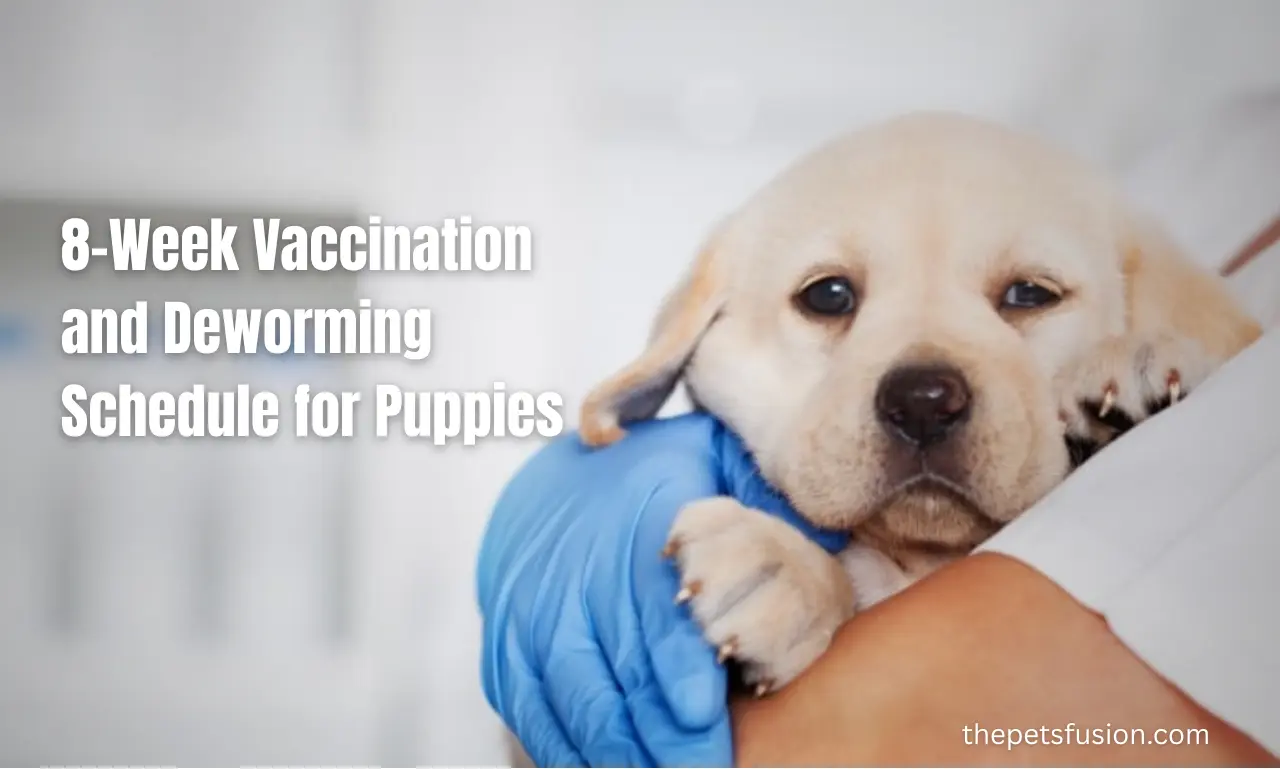Bringing home a new puppy is one of life’s happiest moments—but with that tiny bundle of joy comes a big responsibility. One of the most important things you’ll do for your pup’s health is staying on top of their vaccination and deworming schedule. Puppies are more vulnerable to infections and parasites in the first few months of life, so building their immunity early is essential. But let’s be honest—between names like “DHPP,” rabies, and those tiny worms you can’t even see, it’s easy to feel overwhelmed. When do they need their shots? How often? And what about deworming? Should you take your pet to the vet every time it’s sick? Don’t worry—we’ve got you covered. This comprehensive, beginner-friendly guide breaks down the vaccination and deworming schedule for puppies by age, explains the purpose of each vaccine, and offers tips to keep your pup healthy and protected throughout their life.
Why Puppy Vaccination and Deworming Matter So Much
In those early weeks, your puppy’s immune system is like an empty toolbox—it needs the right tools (aka vaccines) to fight off deadly diseases like parvo, distemper, and rabies. At the same time, internal parasites like roundworms or hookworms can quietly drain your pup’s nutrients, stunt growth, and even spread to humans.
Skipping or delaying vaccines and deworming can leave your puppy at serious risk, not just for illness but even death in extreme cases. The good news? Most of these risks are entirely preventable with the proper care at the right time.
Vaccination and Deworming Schedule for Puppies: What to Know
Let’s break this down by weeks so you know exactly what your pup needs and when. You can also screenshot or save this list to track your puppy’s appointments.
6–8 Weeks Old
Vaccinations:
- DHPP (1st dose) – protects against Distemper, Hepatitis, Parainfluenza, and Parvovirus
Deworming:
- First round of deworming (typically pyrantel pamoate)
- Targets roundworms and hookworms
Vet Tip: Most puppies are born with worms from their mother, even if she looked healthy. First deworming often happens right around this age.
10–12 Weeks Old
Vaccinations:
- DHPP (2nd dose)
- Optional: Bordetella (for kennel cough, especially if boarding or attending puppy classes)
Deworming:
- Second round
- Your vet may rotate dewormers to cover more parasites (e.g., coccidia, whipworms)
14–16 Weeks Old
Vaccinations:
- DHPP (3rd dose)
- Rabies (1st dose) – mandatory by law in most regions
- Optional: Leptospirosis, Lyme (depending on region/lifestyle)
Deworming:
- Third or fourth round, depending on vet protocol
- A fecal test may be done to check if the worms are gone
16–20 Weeks Old (Final Puppy Shots)
Vaccinations:
- DHPP (final booster)
- Rabies (if not already done)
- Others based on your vet’s recommendation (e.g., influenza if you travel a lot)
Deworming:
- Final puppy deworming
- The vet may prescribe heartworm prevention now
What Each Puppy Vaccine Protects Against
DHPP (Combo Vaccine)
- Distemper: A virus that affects the respiratory, digestive, and nervous systems
- Hepatitis (Adenovirus): Affects the liver and eyes
- Parainfluenza: Contributes to kennel cough
- Parvovirus: A Deadly virus causing bloody diarrhea and dehydration
Parvo is fatal in 91% of untreated cases. Timely vaccination can save your puppy’s life.
Rabies
- A fatal virus affecting the nervous system, transmissible to humans
- Required by law in many countries
Leptospirosis (Optional but Highly Recommended)
- Spread via contaminated water or animal urine
- Can cause kidney and liver failure
Bordetella (Kennel Cough)
- Common in social environments like dog parks or kennels
- Usually given as a nasal spray or injection
Don’t miss: What to Do with Pets When Traveling for a Safe, Happy Trip
Understanding Deworming for Puppies
Puppies often carry intestinal parasites from birth or the environment. Left untreated, these worms can cause weight loss, anemia, digestive issues, and even death.
Common Worms in Puppies:
- Roundworms: Common and contagious to humans
- Hookworms: Suck blood and cause anemia
- Tapeworms: Often contracted via fleas
- Whipworms: Affect the large intestine
- Coccidia & Giardia: Protozoal parasites found in water or soil
How Often Should You Deworm a Puppy?
General guidelines:
- Every 2 weeks from 2 to 12 weeks of age
- Then, monthly until 6 months old
- After 6 months: switch to adult prevention (e.g., heartworm meds that also prevent worms)
Worms are zoonotic—some can be passed to humans, especially kids. Always wash your hands after handling puppies.
Puppy Vaccination and Deworming Checklist
| Puppy Age | Vaccines | Deworming |
| 6-8 weeks | DHPP (1st) | 1st round |
| 10-12 weeks | DHPP (2nd), Bordetella (opt.) | 2nd round |
| 14-16 weeks | DHPP (3rd), Rabies | 3rd/4th round |
| 16-20 weeks | Final DHPP booster | Final deworming |
What to Expect After Each Vaccination
Puppy vaccinations are essential, but they can cause minor side effects that may concern first-time pet parents. Knowing what’s normal and what’s not can help you respond appropriately.
Common Mild Side Effects:
- Slight swelling at the injection site
- Mild fever or sleepiness for 24–48 hours
- Decreased appetite
- Occasional sneezing (especially after nasal vaccines)
These symptoms are usually nothing to worry about and clear up on their own.
When to Call the Vet Immediately:
- Vomiting or diarrhea lasting more than a day
- Breathing difficulties
- Collapse or fainting
- Swelling of the face or limbs
If you notice any of these, it could be a rare allergic reaction (anaphylaxis) that requires emergency care.
Natural vs. Medical Deworming: What’s Better?
Pet owners are increasingly curious about natural options, but are they safe?
Natural Deworming:
Some pet blogs promote ingredients like:
- Pumpkin seeds
- Coconut oil
- Apple cider vinegar
While these may support gut health, they are not substitutes for veterinarian-prescribed dewormers, especially for puppies that are highly vulnerable to parasites.
Medical Deworming:
Vet-approved medications like pyrantel, fenbendazole, or milbemycin are:
- Scientifically tested
- Accurate in dosing
- Fast-acting
Vet-approved dewormers are the safest and most effective way to remove worms in puppies.
How to Keep Track of Your Puppy’s Health Records
Staying organized helps avoid missed doses and supports lifelong health.
Options to Track Vaccine & Deworming Schedules:
- Vet-issued health card: Most clinics provide a logbook for tracking each shot.
- Apps: Try apps like Pawtrack or PetDesk to get reminders and store records.
- Google Sheets: Simple and shareable if multiple people care for the pup.
Keeping clear records also makes boarding, grooming, or travelling stress-free.
Do Indoor Puppies Need Vaccines Too?
Yes! Even if your puppy doesn’t go outside much, they’re not fully protected.
How Indoor Dogs Still Get Exposed:
- Parvovirus can live on shoes or sidewalks
- Fleas carrying parasites can come indoors
- Visitors can unknowingly bring in infections
Core vaccines (like DHPP and rabies) are essential regardless of lifestyle.
Travel, Boarding & Puppy Shots: What to Know
Planning a trip or boarding your puppy? You’ll need to meet specific health requirements.
Most Boarding Facilities Require:
- Proof of DHPP and Rabies vaccines
- Bordetella (kennel cough) shot
- Recent deworming or negative fecal test
If You’re Travelling by Plane:
- Check the pet policy of the airline (e.g., Delta requires a health certificate)
- Vaccines must be up to date
- Puppies must be over 8 weeks old to fly
How Puppy Vaccines Impact Long-Term Health
Vaccines don’t just protect your puppy now — they prevent chronic issues later in life.
Long-Term Benefits:
- Preventing neurological damage from distemper
- Avoiding liver/kidney damage from leptospirosis
- Rabies-free certification (essential for international travel)
- Protection from zoonotic diseases (that can infect humans too)
A well-vaccinated puppy is more likely to become a healthy, happy adult dog.
How to Save Money on Puppy Vaccinations
Keeping your puppy healthy doesn’t have to break the bank. Here’s how:
Cost-Saving Tips:
- Look for low-cost vaccination clinics offered by local shelters or pet stores
- Ask your vet about puppy wellness packages (they often bundle services)
- Compare pet insurance plans — some cover routine vaccinations
- Consider getting vaccines done at the county animal services
Be sure to use only licensed and reputable clinics or services.
Don’t miss: 6 Common Goldendoodle Health Issues and Ways to Prevent Them
Frequently Asked Questions
Why do puppies die after vaccination?
In rare cases, severe allergic reactions can occur, but these are highly uncommon. More often, illness after vaccination is due to:
- Pre-existing infections (the puppy was already sick)
- Improper storage of vaccines (at low-quality clinics)
- Vaccine given too early or too late
Always visit a trusted veterinarian and monitor your pup for 24 hours after vaccination.
When do puppies get rabies vaccination?
Most puppies receive the rabies vaccine between 12 and 16 weeks. It’s often combined with the final DHPP booster.
How much is a puppy’s second vaccination?
It varies by clinic and region. On average:
- $30–$50 per shot in the U.S.
- Some shelters and clinics offer low-cost puppy packages or wellness plans.
Is deworming the same as parasite prevention?
Not exactly. Deworming clears existing parasites, while monthly preventives stop new infestations. Both are necessary for complete protection.
Can I give puppy shots at home?
Yes, but only if you’re trained. Improper administration can:
- Reduce effectiveness
- Cause abscesses
- Put your puppy at risk
If in doubt, let a vet handle it.
Bonus: Puppy Health Tips Beyond Vaccines
- Socialize slowly after the 2nd or 3rd shots
- Keep the environment clean (no shared bowls at parks!)
- Watch for side effects like swelling, fever, or vomiting post-vaccination
- Use a puppy journal to track meds, poop, meals, and shots
When to Call the Vet Immediately
Call your vet if your puppy has:
- Vomiting or diarrhea lasting more than 24 hours
- Not eating or drinking
- Swollen face or hives after vaccination
- Bloody stool or worms in poop
- Lethargy or sudden collapse
Better safe than sorry. Puppies can go downhill fast.
Conclusion
Your puppy’s early months set the tone for a lifetime of health. By sticking to the recommended vaccination and deworming schedule for puppies, you’re giving your furry friend the best possible start. Vaccines may feel like a hassle now, but they prevent heartbreak later. Deworming may not be glamorous, but it’s essential. Stay consistent, work closely with your veterinarian, and follow all steps. Healthy puppy, happy life—and fewer vet bills down the road.





